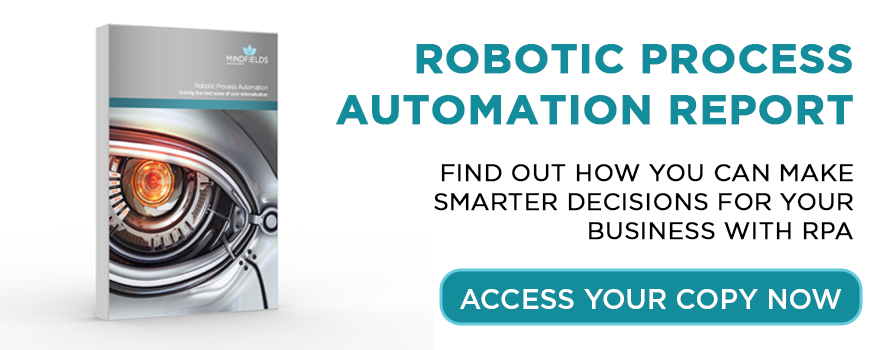Its not often that you find solid business advice in a clip from Family Guy, but this one shows an often overlooked point about the increasingly ambitious aims for robotic process automation … while there may be numerous complex ways to design a smart robot, we still only need one smarter human to kill it ‘by mistake.’
By virtue of working alongside and advising some of the earliest adopters of robotic process automation (RPA) I have observed at first hand the things companies have tried, and seen what has worked, and just as importantly what hasn’t.
I see it as Mindfields responsibility as a leader in the RPA field to share the lessons we have learned with the community ... lets get great at this together.
The RPA journey for us over the last 30 months has been both fascinating professionally and an unbelievable boost for my Frequent Flyer points, which are compounding by every month.
This is truly a global community, learning about and adopting new methods, and I am proud that our company, from Sydney Australia, is now advising clients in a diverse array of locations.
Singapore, Dubai, Amsterdam, London and the US are just some of the increasing number of stamps in my passport, and as the diversity of clients grows, the lessons grow also. Our first ever RPA client is now the world’s largest employer of a “robotic workforce,” and has given us many insights, which are included among the list below.
Please view this list as a kind of open source download, that I share happily with others out there embarking on an RPA journey (or thinking of doing so.)
The length of the list means I will keep the lessons brief, but I am more than happy to discuss any ideas in more detail … so feel free to message me.
- FFF- First Fail Fast
- LAD- Learn Adapt Deliver
- Automate gain areas not pain areas
- There are now real reasons not to work with traditional outsourcing 'partners'?
- But there are great benefits from some new ways of working with outsourcing 'partners'?
- Take all the hype about of RPA and halve it when assessing what it can do right now for your organisation. Most of RPA benefits are overestimated for short term but underestimated in medium to long term.
- Take the time to inform and educate people impacted by RPA – simplify it – remove the “Robo-Language”… it really doesn’t help.
- Process documentation will be lacking and knowledge lost as people move on, so record everything and do not make humans an excuse for failed automation.
- Businesses don’t necessarily understand data structure that well – as an advisor I test what they tell me, in-house execs need to do the same with their colleagues.
- People will feel threatened by the changes, don’t shy away from difficult conversations – be open, honest and supportive.
- Taking the robot out of human.
- Have a clear driver and business case for automation … this isn’t something to do, just because it is fashionable.
- Taking a bottom up approach as workers who feel ownership of a change will work for it, not against it.
- Automation projects should be quick and fast …, think of it more like a T20 cricket match not a five-day Test match
- Segment processes into different categories., I see this akin to how you would treat a pet vs cattle … some will require care and attention ...some will be killed everyday
- Bots are no more immortal than humans, and this is an area of trial and error still. As such organisations must always have a plan for a reverse transition to human or to a smarter RPA tool as market will evolve very fast.
- Internal organisational dynamics management is important … humans still define the success of these initiatives, even though we are talking robots.
- Aim for the number of bots to be at least 15% of the current workforce. If you are going to make a change like this it needs to be worthwhile and not be viewed as tinkering around the edges.
- Different strategies are needed for different operating models … all businesses are different so no “one-size-fits-all” approach is possible (unfortunately for me!)
- You must manage change and risk frameworks rigorously.
- There is a vibrant software scene underpinning RPA, organisations would be best advised to adopt a multiple RPA toolset in a portfolio.
- Automate smartly and modularly.
- Maintain and challenge meaningful human control (MHC) over processes.
- Smart bots require smart humans … and will for the foreseeable future.
- Always plan for the next steps after Automation, this isn’t the end game.
- Minimise learning and set up costs, these are experiments in the eyes of many, so keep the financial outlay down.
- Negotiate Success and fixed price engagements with any external consulting organisations you work with.
- Automate first before refining to make operations leaner.
- Keep an eye on advancement/developments in areas like machine learning, relevant APIs or AI while building bots, the rate of change and advance is both exciting and dizzying.
- Hire smart consultants (you already know where to find one!) or empower your own employees rather than breaking the bank for expensive consulting firms that can’t give your company the individual consideration it needs.
More lessons will unfold, of course as the current generation of robots move through their own lifecycle from birth to retirement. The cycle is getting faster, and the benefits offer up huge opportunities if approached sensibly.
More posts will follow from me as we continue to advise others and also automate our RPA advisory business … there promises to be much to see along the way!
Topic: Robotic Process Automation, Blog


